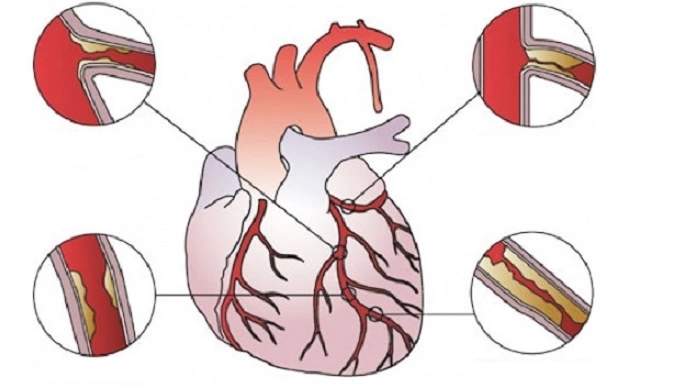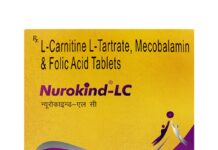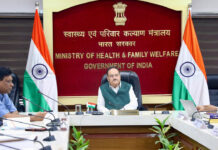Dr. Indrajeet Tyagi and Dr. Iranna Hirapur
The blockage in arteries happen primarily due to plaque formation. Of course, there are other reasons such as an unhealthy diet, lack of adequate physical activities, and a busy lifestyle for this ailment. Heart disease due to the formation of atherosclerotic plaque in the blood vessel has increased since the beginning of the new millennium due to poor diet and the change in lifestyle.
A few symptoms might indicate a possibility of heart block or coronary artery disease.
1) Angina or chest pain is one of the most common symptoms of heart disease, heart block, or CAD. The pain is observed on the left or middle side of the heart, due to the improper supply of oxygenated blood.
2) Dizziness due physical exertion is experienced frequently when person is suffering from severe coronary artery disease.
3) Extreme fatigue, tiredness, and shortness of breath as the heart craves more oxygen are other symptoms of CAD.
4) A silent heart attack can happen due to heart block or CAD, which will not exhibit any symptoms.
5)Palpitations of quivering sensations are also experienced by a CAD or heart block patient.
6) Other conditions such as cholesterol level beyond permissible level, gall bladder stone, PCOD, Metabolic X syndrome, and hypothyroidism can also be indicative of any heart-related problem.
What are the risk factors of coronary artery disease and heart blockage?
Obesity – Obese people can have heart diseases.
Inactive lifestyle – This might augment plaque formation in the coronary artery and can lead to CAD.
Junk foods – Junk food is a proven cause of CAD and other heart-related ailments.
Genetic reasons – Heart diseases occur hereditarily as well.
Smoking tobacco – Tobacco is the main cause for several medical conditions and heart diseases.
What are the types of Coronary Artery Disease?
Coronary Artery Disease (CAD) is categorized into three. 1) Obstructive Coronary Artery Disease: A common type of CAD that happens due to plaque formation in the arteries. A completely blocked artery will lead to a heart attack. 2) Non-obstructive Coronary Artery Disease: Non-obstructive CAD is more common in women than in men. Instead of plaque formation, this ailment is due to issues with the arteries. The symptoms are similar to that of obstructive CAD but a detailed analysis is required for determining the type. 3) Spontaneous Coronary Artery Dissection: This type of CAD occurs spontaneously due to a tear in the wall of the coronary artery. The tear might obstruct blood circulation and cause a heart attack.
What are the diagnosis of coronary artery disease?
Diagnosis of CAD is of utmost importance for finalizing treatments for coronary artery disease. The following tests, namely, ECG, Echocardiogram, Nuclear Scan test, Stress Thallium test, Cardiac Catheterizationhelp in evaluating the condition and confirming the severity.
How can we prevent blocked arteries?
The key to heart health is making smart lifestyle decisions. That begins with consuming healthy foods, doing daily exercise and taking heart related measures that can reduce the likelihood of developing heart disease and clogged arteries.
A)Heart-healthy foods
Healthy foods– consume whole fruits and vegetables, whole grains, herbal teas such as black tea, green tea and ginger tea and avoid foods high in saturated and Trans. fats,
Garlic – include 2-4 garlic cloves or tablets in your daily diet since it is known to reduce bad cholesterol effectively.
Avoid non-vegetarian foods since they increase the risk of heart diseases.
Sour foods – are naturally cardio-protective. Consume a little bit of Tamarind, Amla, Cherries, Sour buttermilk, sour curd, Sour mango, sour pomegranate, lemons, or any other natural sour ingredients since they are rich in vitamin c, which is an anti-oxidant, help keep your blood thin and avoid atherosclerosis (cholesterol, clot deposition in heart arteries).
Asafoetida, coriander, cumin, dates, raisins – use these in your diet.
Use rock salt – this is rich in minerals.
- B) Exercise- establish a physical exercise regimen of at least 150 minutes of exercise each week—that is about 30-minute workouts a day.
C)Other heart related measures – Control your blood pressure, quit smoking, avoid being overweight, have below average cholesterol, and normal blood sugar level.
What Non-surgical Treatments Are Available?
Previously, bypass surgery was the main treatment for clogged or blocked arteries. Fortunately, non-surgical, less-invasive treatments are there to treat blocked arteries.
Statin medications: Statins are prescribed medications to lower your heart cholesterol and stabilize the plaque on your artery walls by inhibiting the formation of cholesterol in your liver and preventing it from circulating throughout your body. They also lower the risk for heart disease and stroke.
Angioplasty and Stents: Balloon angioplasty is minimally invasive procedure that opens narrowed arteries by targeted inflation. A small catheter is used to guide a balloon into place, widening the artery for adequate blood flow. Often, during balloon angioplasty, stents are also used to ensure the artery walls remain open. Stents are small mesh wired tubes that support the artery walls for extended sustainability and support.
Aspirin: Doctor may prescribe a regimen of aspirin to manage or decrease the likelihood of bleeding, heart attack and stroke based on an individual assessment of risk.
Authors: Dr. Indrajeet Tyagi, M. R. Medical College, Kalaburagi, Karnataka and Dr Iranna S. Hirapur, MD, DM (Cardiology) Interventional Cardiologist at Heart Foundation,Kalaburagi, Karnataka







